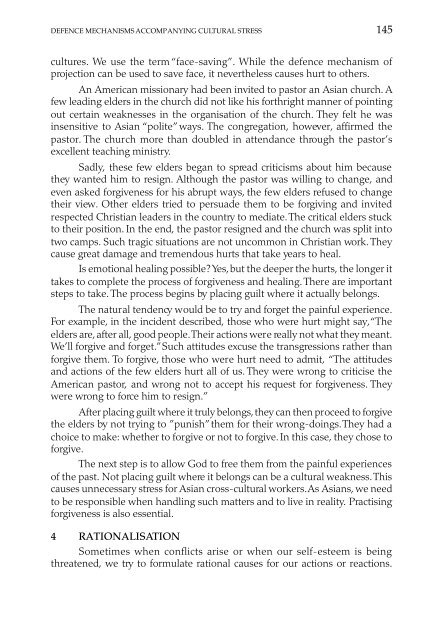WHEN YOU CROSS CULTURES - World Evangelical Alliance
WHEN YOU CROSS CULTURES - World Evangelical Alliance
WHEN YOU CROSS CULTURES - World Evangelical Alliance
Create successful ePaper yourself
Turn your PDF publications into a flip-book with our unique Google optimized e-Paper software.
DEFENCE MECHANISMS ACCOMPANYING CULTURAL STRESS<br />
145<br />
cultures. We use the term “face-saving”. While the defence mechanism of<br />
projection can be used to save face, it nevertheless causes hurt to others.<br />
An American missionary had been invited to pastor an Asian church. A<br />
few leading elders in the church did not like his forthright manner of pointing<br />
out certain weaknesses in the organisation of the church. They felt he was<br />
insensitive to Asian “polite” ways. The congregation, however, affirmed the<br />
pastor. The church more than doubled in attendance through the pastor’s<br />
excellent teaching ministry.<br />
Sadly, these few elders began to spread criticisms about him because<br />
they wanted him to resign. Although the pastor was willing to change, and<br />
even asked forgiveness for his abrupt ways, the few elders refused to change<br />
their view. Other elders tried to persuade them to be forgiving and invited<br />
respected Christian leaders in the country to mediate. The critical elders stuck<br />
to their position. In the end, the pastor resigned and the church was split into<br />
two camps. Such tragic situations are not uncommon in Christian work. They<br />
cause great damage and tremendous hurts that take years to heal.<br />
Is emotional healing possible? Yes, but the deeper the hurts, the longer it<br />
takes to complete the process of forgiveness and healing. There are important<br />
steps to take. The process begins by placing guilt where it actually belongs.<br />
The natural tendency would be to try and forget the painful experience.<br />
For example, in the incident described, those who were hurt might say, “The<br />
elders are, after all, good people. Their actions were really not what they meant.<br />
We’ll forgive and forget.” Such attitudes excuse the transgressions rather than<br />
forgive them. To forgive, those who were hurt need to admit, “The attitudes<br />
and actions of the few elders hurt all of us. They were wrong to criticise the<br />
American pastor, and wrong not to accept his request for forgiveness. They<br />
were wrong to force him to resign.”<br />
After placing guilt where it truly belongs, they can then proceed to forgive<br />
the elders by not trying to ”punish” them for their wrong-doings. They had a<br />
choice to make: whether to forgive or not to forgive. In this case, they chose to<br />
forgive.<br />
The next step is to allow God to free them from the painful experiences<br />
of the past. Not placing guilt where it belongs can be a cultural weakness. This<br />
causes unnecessary stress for Asian cross-cultural workers. As Asians, we need<br />
to be responsible when handling such matters and to live in reality. Practising<br />
forgiveness is also essential.<br />
4 RATIONALISATION<br />
Sometimes when conflicts arise or when our self-esteem is being<br />
threatened, we try to formulate rational causes for our actions or reactions.

















